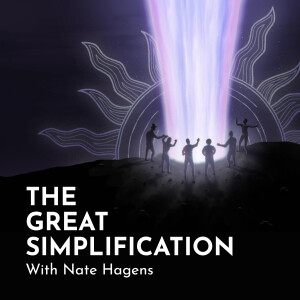
The Great Simplification with Nate Hagens
Science:Earth Sciences

Deep(er) Ecology: William Rees, Nora Bateson & Rex Weyler | Reality Roundtable #02
 2023-07-09
2023-07-09
On this segment of Reality Roundtable, Nate is joined by William Rees, Nora Bateson, and Rex Weyler to discuss the purpose of ecology and what it might look like to have a civilization centered around it. Despite our tendency to think of ourselves as separate from the biosphere, humans are a part of it, just like any other animal. What sets us apart now is our outsized impact on the world around us, as we and our societies take up more space and resources, degrading the ecosystems that support ourselves, our descendants, and other species. How can an understanding of systems and relationships help us rethink how we interact with the planet? Could ecologically literate governments and citizens create wider boundaries across time and space in which decisions are made? What might the parameters be for a civilization centered around ecology, and how can we navigate there through declining energy and resource availability? Most of all, how can we as individuals and communities root ourselves into a deep(er) ecological knowledge and way of being?
About Nora Bateson
Nora Bateson is an award-winning filmmaker, writer and educator, as well as President of the International Bateson Institute, based in Sweden. Her work asks the question “How can we improve our perception of the complexity we live within, so we may improve our interaction with the world?”.
An international lecturer, researcher and writer, Nora wrote, directed and produced the award-winning documentary, An Ecology of Mind, a portrait of her father, Gregory Bateson. Her work brings the fields of biology, cognition, art, anthropology, psychology, and information technology together into a study of the patterns in ecology of living systems. Her book, Small Arcs of Larger Circles, released by Triarchy Press, UK, 2016 is a revolutionary personal approach to the study of systems and complexity.
About William Rees
William Rees is a population ecologist, ecological economist, Professor Emeritus and former Director of the University of British Columbia’s School of Community and Regional Planning in Vancouver, Canada. He researches the implications of global ecological trends for the longevity of civilization, with special focus on urban (un)sustainability and cultural/cognitive barriers to rational public policy. Prof Rees is best known as the originator and co-developer with Dr Mathis Wackernagel of ‘ecological footprint analysis’ (EFA), a quantitative tool that estimates human demands on ecosystems and the extent to which humanity is in ‘ecological overshoot.’ Dr Rees is a founding member and former President of the Canadian Society for Ecological Economics; a founding Director of the OneEarth Living Initiative; a Fellow of the Post-Carbon Institute and an Associate Fellow of the Great Transition Initiative.
About Rex Weyler
Rex Weyler is a writer and ecologist. His books include Blood of the Land; the Government and Corporate War Against First Nations, nominated for a Pulitzer Prize; Greenpeace: The Inside Story, a finalist for the BC Book Award and the Shaughnessy-Cohen Award for Political Writing; and The Jesus Sayings, a deconstruction of first century history, a finalist for the BC Book Award.
In the 1970s, Weyler was a cofounder of Greenpeace International and editor of the Greenpeace Chronicles. He served on campaigns to preserve rivers and forests and to stop whaling, sealing, and toxic dumping.
He currently posts the “Deep Green” column at the Greenpeace International website. He lives on Cortes Island in British Columbia, with his wife, artist Lisa Gibbons.
Watch on YouTube: https://youtu.be/GE39xfNRRyw
For Show Notes and More visit: https://www.thegreatsimplification.com/episode/rr02-bateson-rees-weyler
More Episodes
 2024-03-08
2024-03-08
 2024-03-06
2024-03-06
 2024-02-16
2024-02-16
 2024-01-19
2024-01-19
 2024-01-10
2024-01-10
 2024-01-05
2024-01-05
 2023-12-18
2023-12-18
Create your
podcast in
minutes
- Full-featured podcast site
- Unlimited storage and bandwidth
- Comprehensive podcast stats
- Distribute to Apple Podcasts, Spotify, and more
- Make money with your podcast
It is Free
- Privacy Policy
- Cookie Policy
- Terms of Use
- Consent Preferences
- Copyright © 2015-2024 Podbean.com




